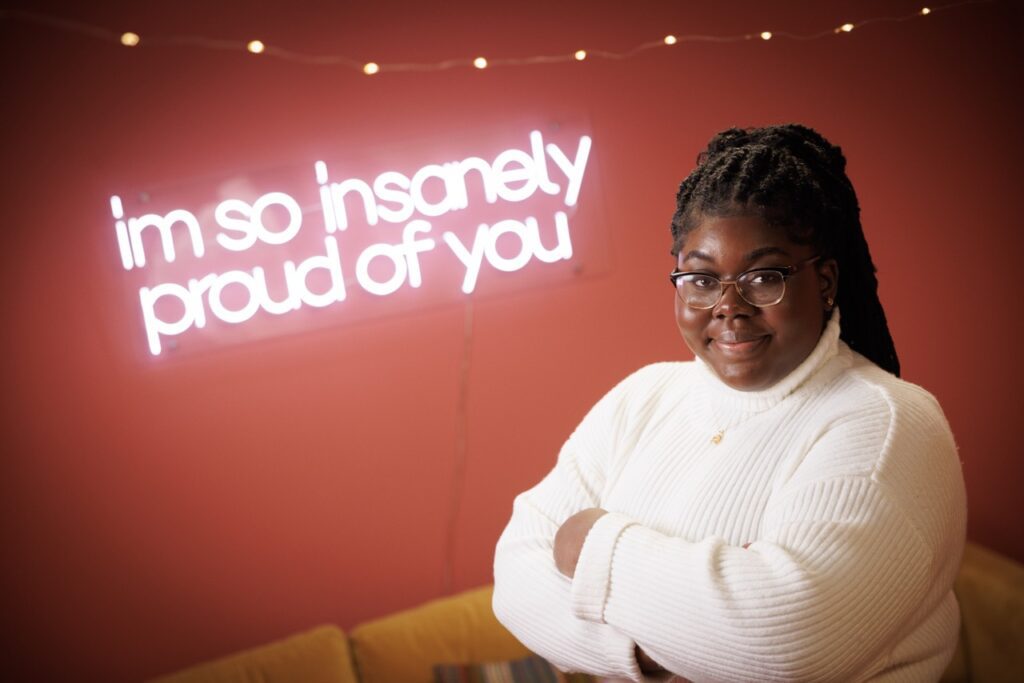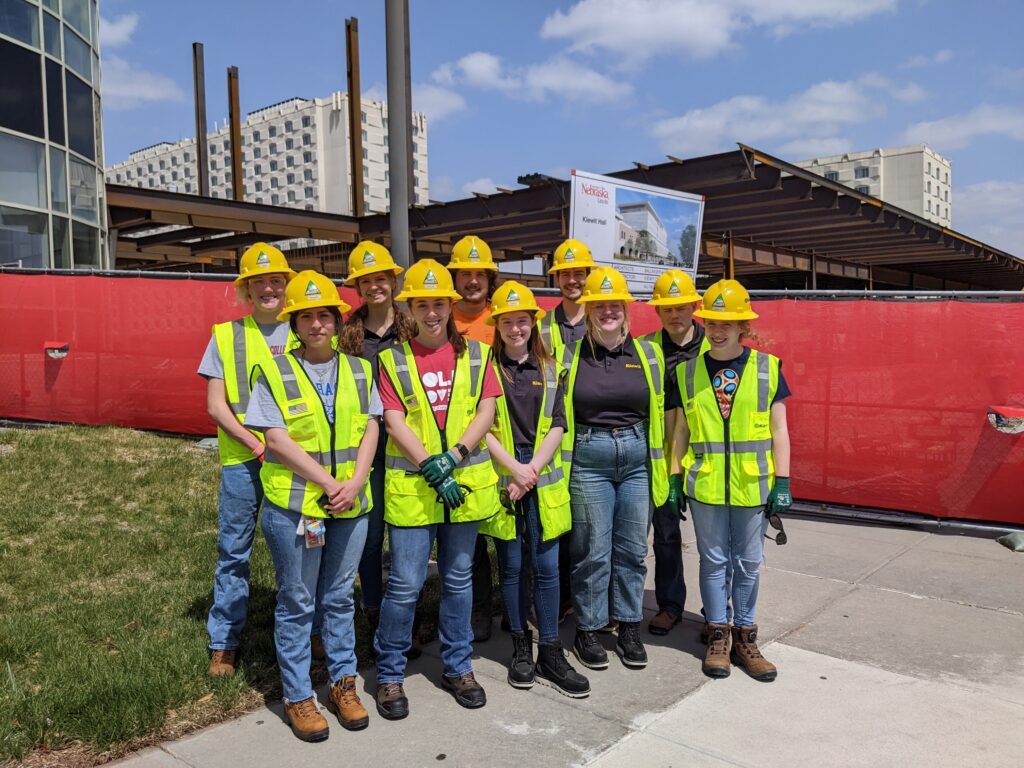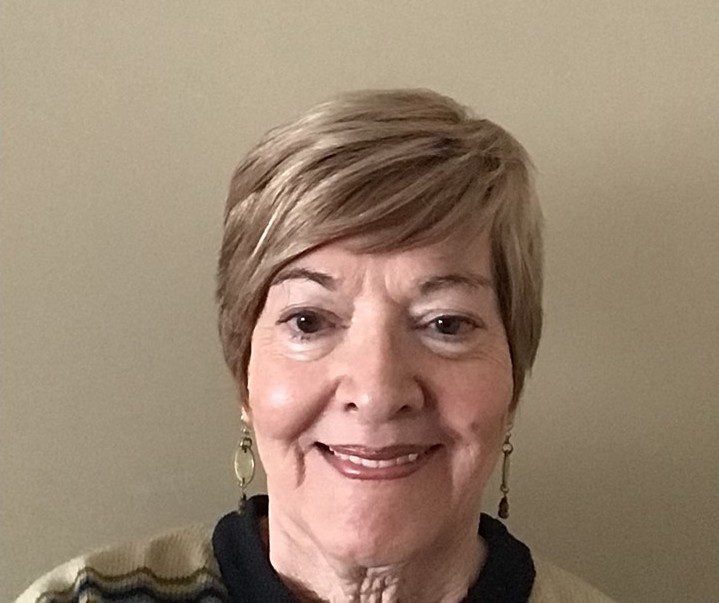For the First Time, Future Physicians Will Complete Their Medical Training in Kearney
By Kelsey Kirk
Cordelia Harbison grew up visiting Lexington Regional Health Center in Lexington, Nebraska.
For at least a decade, she would drop off dinner to her stepmom, who was a nurse at the hospital.
Those night-shift visits showed Harbison the impact that physicians can have on their patients, especially in a rural part of the state. And it made her realize a career in medicine was within reach.
“That drove me to want it even more,” Harbison said, “especially seeing the amount of good you can do in a rural area.”
Harbison is in her freshman year at the University of Nebraska at Kearney. She’s majoring in chemistry with a health science emphasis. She plans to become a family practice physician.
Harbison, 19, will stay in Kearney — a 30-minute drive from her family home in Lexington — for the duration of her collegiate career. And upon finishing medical school, Harbison hopes to stay in central Nebraska to practice in a rural town.
That’s one of the goals of the Kearney Health Opportunities Program, a joint project between UNK and the University of Nebraska Medical Center that was established in 2010. In 2015, the $19 million UNMC-UNK Health Sciences Education Complex opened its doors, offering programs in nursing and allied health professions on campus in Kearney.
Now the two campuses have teamed up again, this time offering start-to-finish training for physicians. UNMC is bringing its College of Medicine to Kearney with the planned construction of an $95 million Rural Health Education Building.
The continued collaboration is designed to meet the urgent demand for health care workers in rural Nebraska. Dentists, nurses, pharmacists and numerous allied health professionals are in short supply, and the state has designated every county in Nebraska, except for urban Douglas and Lancaster, as health care shortage areas. But perhaps nowhere are the shortages more urgently felt than in primary care. A 2022 report by UNMC Rural Health Initiatives said more than a quarter of counties in Nebraska have either no family physician or just one family physician serving an area of more than 2,000 people.
The Rural Health Education Building, set to be complete in 2025, for the first time will allow future physicians to complete their medical training in Kearney and bring public health and pharmacy students to UNK while expanding offerings for allied health and nursing students. The initiative aims to build on the success of the Health Sciences Education Complex, which has seen 85% of its graduates start their careers in rural Nebraska.
“It’s almost shocking to think you can have (an academic) medical center here in Kearney, Nebraska,” Harbison said. “I am excited because I don’t know of many medical centers in small towns. This is going to be the center of Nebraska, a diamond in the rough.”
Harbison said she’s excited to be part of the program, especially as a member of one of the first generations to go through it.
“It’s almost shocking to think you can have (an academic) medical center here in Kearney, Nebraska,” Harbison said. “I am excited because I don’t know of many medical centers in small towns. This is going to be the center of Nebraska, a diamond in the rough.”
Harbison wants to return to a small community after graduation. The Lexington area would be ideal, she said, but she would enjoy serving elsewhere in central Nebraska, too.
While Harbison briefly considered going into pharmacy, shadowing physicians in Lexington let her see the difference in how physicians work compared with pharmacists.
“That kind of put me in their shoes,” she said.
Those shadowing experiences were moving, Harbison said, especially seeing the way each doctor knew their patients on a more personal level.
Harbison, who is bilingual in English and Spanish, was especially moved to see physicians working with Spanish-speaking patients and connecting with them despite the language barrier.
Another driving factor was the experience Harbison’s sister had during her pregnancy. When Harbison’s sister, who lives in the Ogallala area, went into labor, her doctor was at another appointment 60 miles away.
In her sister’s case, everything went smoothly. But Harbison said other people may not have the same positive outcomes.
“I want to be able to help,” she said. “You don’t want to have to go through that stuff alone.”
The decision to land at UNK fell into place her senior year of high school, Harbison said. Staying close to her hometown was a plus and felt less intimidating than moving to Omaha to attend UNMC after graduation.
The Kearney Health Opportunities Program’s goal is to support health care workers in training and improve health care delivery in rural areas. Harbison identified with that objective, and she wanted to make her intentions clear in her applications. She even made her siblings read all her scholarship applications to be sure she was getting the message across.
“I want to see rural areas that don’t have to struggle with health care,” Harbison said. “I wanted to express how seriously I wanted to return. Some people sign up with no intention of returning to a rural area. I want to give back to people what they gave to me.”
Harbison said students in the program all have the same end goal: making a difference as physicians and health care workers.
“We’re not so much competing with each other and trying to outwork one another, but helping each other achieve the same goal,” Harbison said. “Everyone genuinely wants each other to succeed.”
The official groundbreaking for the Rural Health Education Building was Sept. 5.




